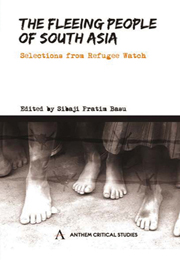Book contents
- Frontmatter
- Contents
- Acronyms and Abbreviations
- Foreword by Ranabir Samaddar
- Preface
- ETHICAL ISSUES
- LAWS
- SOUTH ASIA
- INDIA
- GENDER
- INTERVIEW/CORRESPONDENCE
- REPRESENTATIONS
- Introduction
- Creativity's Mirror
- Writing Displacement: Creativity and Objectivity
- Boundaries, Borders and Bodies
- Forced Displacement and Identity Formation in the EU
- The Changing Scales of Good and Evil: Morality Plays at the Profiled EU and US Borders
- Index
Introduction
from REPRESENTATIONS
Published online by Cambridge University Press: 05 March 2012
- Frontmatter
- Contents
- Acronyms and Abbreviations
- Foreword by Ranabir Samaddar
- Preface
- ETHICAL ISSUES
- LAWS
- SOUTH ASIA
- INDIA
- GENDER
- INTERVIEW/CORRESPONDENCE
- REPRESENTATIONS
- Introduction
- Creativity's Mirror
- Writing Displacement: Creativity and Objectivity
- Boundaries, Borders and Bodies
- Forced Displacement and Identity Formation in the EU
- The Changing Scales of Good and Evil: Morality Plays at the Profiled EU and US Borders
- Index
Summary
This section contains five articles. The first two reflect on the problems and prospects of refugee representation in creative literature as well as in the media. The business of representation is drawing keen theoretical attention in recent years. Modes of representation are being seen as arenas for textualizing and performing subjectivity. Essentially, ‘representation’ is a work of substitution. The process of representation substitutes somebody/something for the other, in order to re-present somebody/something with an ‘original’ point of reference. Thus, in the process, it becomes a kind of un/intentional distortion/deformation of ‘the original’, whatever might be the amount (lesser/greater) such distortion/ deformation.
The risk of such distortion/deformation runs through all attempts of representation. This can be done by an ‘outsider-powerful’ or an insider/self-representative. This point occupies the centre of a debate, which began since the publication of Edward Said's Orientalism (1978). In this seminal work, Said famously quotes a line from Marx's The 18th Brumaire of Louis Bonaparte, to describe the desire of the ‘outsiderpowerful’ (in this case, the Western ‘Orientalist’ scholars) to represent the (mute and weak) Orient: ‘They cannot represent themselves; they must be represented’. This desire to represent the mute Orient led the Orientalists to rebuild/refashion the Orient according their (imperialist) imagination.
Although the postcolonial self-representation (of the formerly colonized) seeks to invert the colonial/imperialist (distorted) representation of the native, the same theoretical objections can be raised against an indigenous self-representation, since it reintroduces the problem of the theoretical impossibility of simply producing a ‘true’ representation.
- Type
- Chapter
- Information
- The Fleeing People of South AsiaSelections from Refugee Watch, pp. 397 - 399Publisher: Anthem PressPrint publication year: 2009

